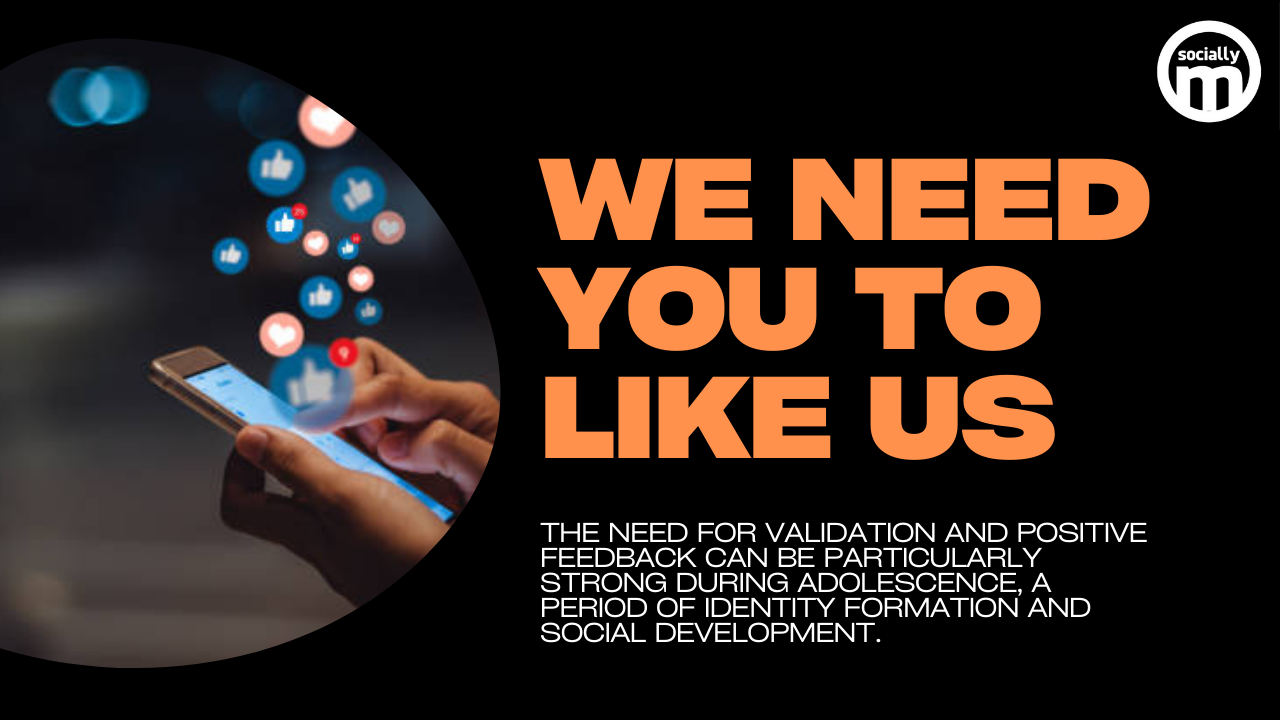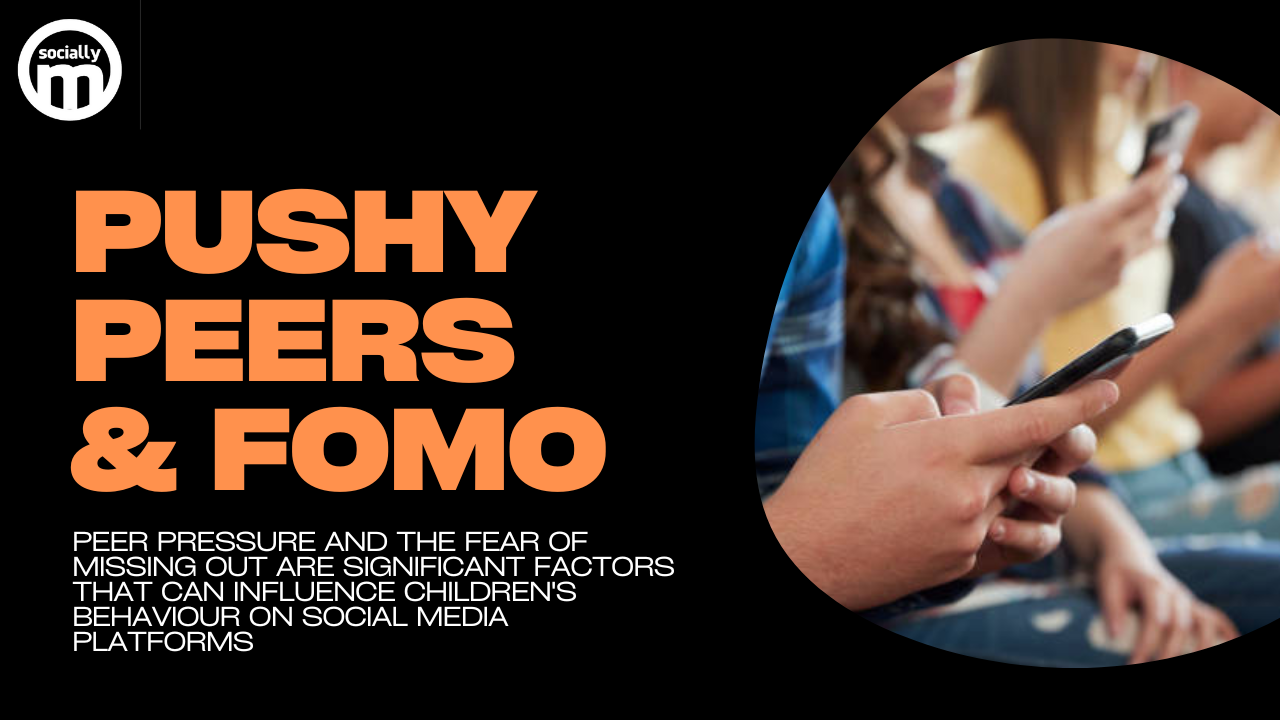|
Following our recent blogs on why children and teenagers feel almost compelled to be on the same social media platforms as their peers, this week we're exploring the links between likes and validation.
Children, like people of all ages, seek validation and likes on social media for a variety of psychological and social reasons. This need for validation and positive feedback can be particularly strong during adolescence, a period of identity formation and social development. Here are some key reasons why children may seek this kind of attention from both their peers and total strangers on social media: Social Acceptance: Adolescents are in the process of forming their identity and often seek affirmation from their peers. Receiving likes and positive comments on social media can make them feel accepted and validated by their online community. Self-Esteem: Positive feedback on social media can boost a child's self-esteem and self-worth. Each like, comment, or share can provide a sense of accomplishment and approval, reinforcing their self-image. Peer Comparison: Adolescents frequently compare themselves to their peers. The number of likes and followers they have can become a measure of social status and popularity, which can lead them to seek more validation through these metrics. Attention and Recognition: Social media allows children to showcase their talents, achievements, and interests to a potentially vast audience. Receiving likes and positive comments can give them a sense of recognition and attention they may not receive in other aspects of their lives. Emotional Connection: Social media can provide a sense of connection and belonging. Likes and positive comments can be seen as expressions of friendship and support, which can be emotionally fulfilling. Reinforcement of Behaviour: When children post content and receive positive feedback, it reinforces the behaviour of posting and sharing more content. This cycle of posting and receiving likes can become habit-forming and increase the desire for validation. Peer Pressure: Many children may feel pressured to conform to social norms and seek validation in ways that are consistent with their peer group. This can include posting certain types of content or aiming for a specific level of engagement. Dopamine Release: The act of receiving likes, comments, or shares on social media triggers the release of dopamine in the brain, which is associated with pleasure and reward. This can create a sense of instant gratification, reinforcing the desire for more likes. Validation of Identity: Children use social media to express and experiment with different aspects of their identity. Likes and positive comments can validate these self-expressions, making them feel more secure and comfortable in their identities. It's important for parents and guardians to be aware of the desire for validation on social media and to guide children in using social media responsibly. Encouraging a healthy balance between online and offline activities, discussing the potential impact of social media on self-esteem, and promoting self-worth based on internal factors rather than external validation can help children develop a more positive relationship with social media and a healthier sense of self-esteem. Are you seeing the same in your children? Are these posts useful to you? As always, I'm keen to hear what you think and to answer any questions you might have. Please leave your comments below. Yours Socially M
0 Comments
I received some interesting feedback after last week's post, with some refusing to accept that there was an obsession amongst our young people to remain connected online and others letting me know that they understood exactly where I was coming from as they had seen similar behaviour from their own children or friend's children.
Regardless of which camp you find yourself in, people from both sides started to ask me what was causing the behaviour and more importantly, what could they do to improve or change it. So, I thought this week it might be a good idea to expand on some of the ideas from the last post, starting with Peer Pressure and the Fear of Missing Out (FOMO) which are both significant factors that can influence children's behaviour on social media platforms. Let's start with peer pressure and ask ourselves what we understand by the term. Social media platforms are often used by children to connect with friends and peers, and just like the real world it's very easy for their behaviour to be influenced by what their friends say or do online. How many times have you heard from children "everyone else is doing it"? Because that's exactly what we're talking about, young people feeling that it's okay to behave a certain way because they've seen others do it or have been actively encouraged by their peers online. There can be many reasons for this 'cyber peer pressure', but from the work I've been doing recently I have identified what I would consider the main three, as follows. Desire for Acceptance: Children often want to fit in and be accepted by their peers. On social media, this can manifest as a desire to emulate the behaviours and interests of their friends or online influencers they admire. We often see our young people acting out trends from TikTok, copying popular styles of posts from Instagram or emulating their vlogging heroes on YouTube. Often this is simply harmless fun, but sadly we have seen a darker side to this behaviour, especially when it's done at the expense of others, to embarrass, shame or prank. Essentially, it is all designed to ensure that figurative pat on the back and to gain that perceived 'one of us' accolade. Conforming to Trends: Children may feel pressured to follow trends and popular opinions on social media, even if they don't necessarily align with their own values or beliefs. They may do this to avoid feeling left out or to gain social approval. For many it's an easy way to be seen as part of the in-crowd, even if the messages they are sharing or publicly agreeing with go against their cultural backgrounds or even in extreme cases, their religion. For many it's far more important to be popular than it is to be themselves online. Competitive Nature: Peer pressure on social media can also lead to a sense of competition among children. They may compete for likes, followers, and engagement with the hope of outperforming their friends or rivals on the platform. This is immediately apparent in the world of online gaming, which has been responsible for many a teenager screaming down a microphone at online opponents. I've even heard of examples of people buying fake followers for their rivals social accounts in the hope that the platform bans them for 'gaming' the system. Not very sporting, but proof of a win at any cost attitude. FOMO or the Fear of Missing Out can be a little more complicated from a psychological standpoint, but essentially we're talking about being so worried about missing out on what others are doing or saying online that it can drive us to constantly check and engage with social media to stay in the loop. Often leading young people to check their phones in inappropriate places or at inappropriate times. Like during school lessons, for example, which is making headline news in the UK today with the Secretary of State for Education Gillian Keegan calling for a complete ban on mobile devices in schools. Again, there are many reasons why FOMO can take hold of someone and influence their behaviour, but again, I have found there to be three main reasons which we can explore further. Constant Connectivity: FOMO is driven by the fear that something interesting or important is happening online, and if you're not constantly connected, you'll miss out. Children may worry that they'll miss out on fun activities, news, or conversations if they don't check their social media feeds regularly. For the same reason they may send messages to each other and expect instant replies, becoming anxious or aggressive when this doesn't happen in what they perceive to be an acceptable timeframe. Exclusivity: Social media often portrays events and experiences in a way that makes them seem exclusive and exciting. Children may fear missing out on exclusive parties, gatherings, or opportunities that they see their peers posting about. The immediateness of knowing what others are doing almost instantaneously can appear like a form of addiction. Something which some platforms have tapped into, for example SnapChat's 'snapmaps' where your connections' locations are shown and their movements regularly updated. Comparison with Others: FOMO can be exacerbated by comparing one's own life to the carefully curated and often idealised lives of others on social media. This can lead to feelings of inadequacy and anxiety, which can cause more obsessive behaviour both online and off. Fashion and make-up tutorials all seem fairly harmless and well-intentioned, but we have to be aware of the potential links between body-dysmorphia, self-esteem issues and the pursuit of perfection in online posts. So if we know what's affecting the behaviour of our social media minded youth, what can we do about it? Here's a few tips to help if you know someone struggling or are seeing some worrying behaviour. Open Communication: Encourage open and non-judgmental communication with your child about their experiences on social media. Let them know they can talk to you if they encounter peer pressure or feelings of missing out. Digital Literacy: Teach your child critical thinking skills, including how to evaluate the authenticity and relevance of the content they encounter online. Help them understand that not everything they see on social media accurately represents reality. Set Boundaries: Establish clear rules and boundaries for social media use, including screen time limits and age-appropriate content guidelines. These boundaries can help reduce the pressure to constantly check social media. Encourage Offline Activities: Promote offline activities, hobbies, and social interactions to help your child develop a well-rounded life outside of social media. Encourage them to explore their interests and passions offline. Positive Role Models: Share stories of individuals who have achieved success and happiness without relying on social media for validation. Encourage your child to look up to positive role models who prioritise balance and well-being. Promote Self-Esteem: Help your child build self-esteem and self-worth offline, so they are less reliant on social media for validation. Encourage them to develop a strong sense of self and self-confidence. Model Healthy Behaviour: Be a positive role model by demonstrating responsible and balanced social media usage. Your own behaviour can influence your child's attitudes and habits regarding social media. By addressing peer pressure and FOMO on social media and providing guidance and support, can parents help their children navigate the digital world more effectively and develop healthier online habits? I'd be interested to hear your thoughts and experiences, join the conversation in the comments. Yours Socially M |
Archives
October 2023
|



 RSS Feed
RSS Feed
